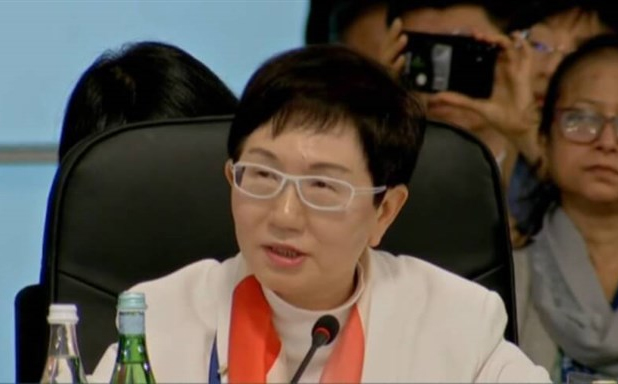At the 58th Annual Meeting of the Asian Development Bank (ADB) in Milan, Taiwan’s Finance Minister Chuang Tsui-yun made a firm and public diplomatic protest against the bank’s continued use of the designation “Taipei,China”, which has been applied to Taiwan since 1986. In her speech and direct interactions with ADB leadership, Chuang asserted Taiwan’s founding member status and called for correction and equal treatment under the bank’s governance framework.
This move highlights Taiwan’s ongoing struggle for international recognition and its resistance to diplomatic marginalization, especially in institutions where it plays an active role.
In-Depth Analysis
Why Taiwan Is Protesting Now
Taiwan has been referred to as “Taipei,China” in ADB documentation and meetings for nearly four decades—ever since China was granted membership in 1986. This label, widely seen as a political concession to Beijing’s “One China Principle,” implies Taiwan is a regional entity under Chinese sovereignty.
Minister Chuang’s protest is timely and strategic, given that:
- The ADB is undergoing institutional reforms aimed at strengthening equity and inclusiveness.
- A new president, Masato Kanda, has just taken office at the ADB, providing a diplomatic window to revisit legacy policies.
- The ADB meeting is being held in Europe for the first time in 9 years, which brings greater global visibility to Taiwan’s protest.
Taiwan’s Role in the ADB
Despite the label, Taiwan—officially the Republic of China (ROC)—has maintained full financial and operational commitments to the ADB:
- US$1.51 billion in capital contributions since its founding role in 1966.
- Over US$133.43 million in special funds contributions to support developmental projects in Asia.
Taiwan has never defaulted on its obligations and continues to support climate action, digital transformation, and regional cooperation, despite being diplomatically isolated.
The Broader Diplomatic Message
Chuang’s protest serves not just as a symbolic statement but as part of Taiwan’s broader diplomatic strategy to:
- Challenge China’s growing influence in multilateral institutions.
- Reaffirm Taiwan’s international identity and agency.
- Promote rules-based cooperation and prevent political suppression in non-political institutions.
Taiwan’s emphasis on contributing its developmental experience, particularly in tech, finance, and public health, is also a subtle form of soft diplomacy, aligning itself with like-minded liberal democracies.
Taiwan’s Position: Legal and Ethical Grounds
The ADB is not a political body but a development-focused financial institution. Taiwan argues that:
- Its designation should reflect its legal membership status and not be influenced by external political pressure.
- The current designation undermines the principle of equal treatment of all members.
- It violates the ADB’s own values of inclusive development, equity, and respect for all stakeholders.
What Could Happen Next?
Though a name change at the ADB may not happen immediately, Taiwan’s protest may:
- Influence internal debates within the ADB.
- Encourage sympathetic members like Japan, the U.S., and European nations to advocate behind the scenes.
- Serve as a precedent for similar protests at other international organizations where Taiwan is marginalized.
FAQ
Why is Taiwan called “Taipei,China” at the ADB?
The ADB adopted the label in 1986 when the People’s Republic of China joined the bank, pressuring for Taiwan’s designation to be modified in line with its political stance.
Is Taiwan still a member of the ADB?
Yes, Taiwan (ROC) is a founding member and continues to fulfill all obligations, including financial and developmental contributions.
What is Taiwan asking for?
Taiwan wants the restoration or correction of its designation to reflect its founding status and separate identity, asserting it should not be politically marginalized.
Has the ADB responded to Taiwan’s protest?
As of now, no public statement has been issued by the ADB in response to Minister Chuang’s remarks.
How much has Taiwan contributed to the ADB?
Taiwan has contributed US$1.51 billion in capital and US$133.43 million to special funds as of December 2024.


